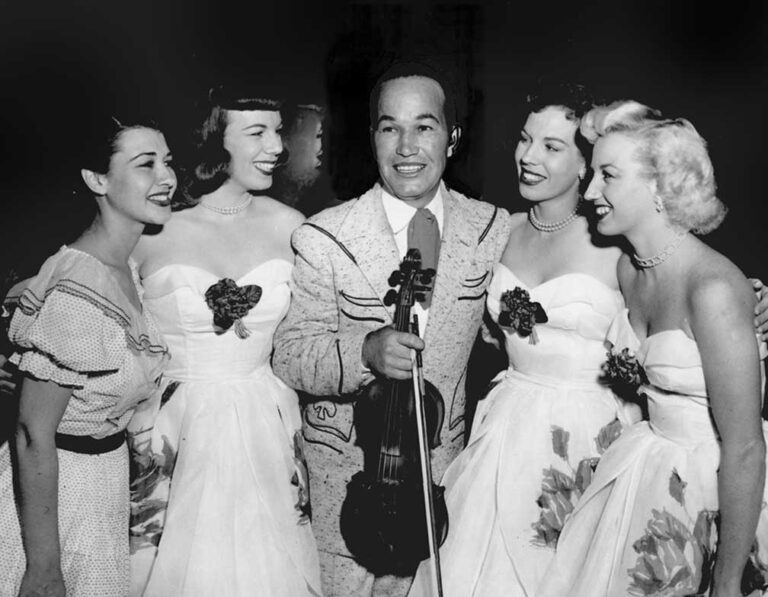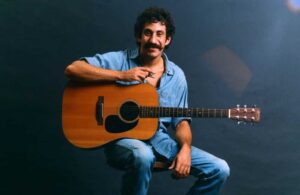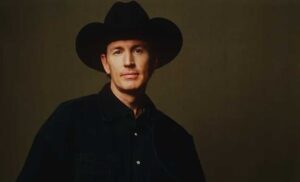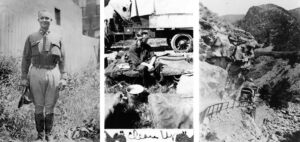It’s generally accepted that Bob Wills, along with his Texas Playboys, remains the “King of Western Swing.”
But in the 1940s and early 1950s, a competition was afoot.
While Wills held firm control of Western Swing bragging rights in Texas, on the West Coast, another musician — “Spade” Cooley — busily fought Bob Wills for the top spot.
Cooley was indeed a fine musician, band leader and part-time silver screen star. He even had some accomplishments to back up his claim to being Hollywood’s “King of Western Swing.”
But in spite of any acclaims Cooley received as an entertainer, his legacy is that of a vile human being.
Donnell Clyde Cooley was born in 1910 in Grand, Oklahoma, a community that today is a ghost town a few miles east of the Texas Panhandle.
Because he was one-quarter Cherokee, Cooley attended what was then known as an “Indian School” in Oregon. It was there he perfected the art of playing the fiddle — something his father had introduced him to back on the pre-depression Oklahoma farm.
In fact, Cooley had his eyes set on becoming not just a fiddler but a violin virtuoso. However, he was held back from this goal by lack of access to a formal music education and violin-specific lessons. But he “made do” as what musicians might consider a second-rate violinist — a fiddler with flexibility to play varied forms of music.
When he was 17, Cooley returned to Oklahoma and married his first wife. The entire family moved to the West Coast during the Dust Bowl years, however, and Cooley’s set out to forge his path. Unlike the rest of his family, he would not be a migrant farm laborer.
His future was in music.
Soon after arriving in California, Cooley earned the nickname “Spade” after a particularly successful run at the poker table. To hear Cooley tell the story, he drew three consecutive full houses of spades — but that claim is highly questionable. The odds of drawing a full house of spades just once are only 1 in 13,000. One can only imagine the odds of doing it three consecutive times!
Regardless, the nickname stuck. It may have been an early indicator of Cooley’s shady character.
While his family worked in the fields, Cooley took a job playing the fiddle in the Venice Pier Ballroom, a venue that drew thousands of dancers on weekend nights throughout the year.
As lead fiddler in Jimmy Wakely’s Big Band, Cooley gained a lot of exposure. Then, when Wakely quit the band for a career as an actor, Cooley took over as bandleader. The following 18 months brought the Venice Pier Ballroom some of its biggest fame as Cooley took Bob Wills head-on in the fight for “King of Western Swing.”
As part of his battle to be king, Cooley hired Tex Williams, a deep baritone, as his lead vocalist. Williams’ counterpart in Bob Wills’ Texas Playboys was the famed Tommy Duncan.
As far as Cooley was concerned, the fight for supremacy was on.
In 1944, Cooley recorded his first successful record, “Shame on You,” which perhaps offered a hint of what was to come as he embarked upon a womanizing, heavy-drinking lifestyle. The song sat at No. 1 for a full two months and was one of six consecutive Top 10 tunes he recorded.
Perhaps Cooley’s most notable tune was “Detour (there’s a muddy road ahead),” a song that today still receives occasional airplay on online country music platforms. During this period, he married his second wife, Ella Mae Evans, a singer in his band.
Despite Cooley’s immense success as a bandleader, his eye was on the silver screen.
One afternoon, he was hanging around Gene Autry’s set, and Autry almost mistook Cooley for Roy Rogers. Autrey introduced the two, and Rogers hired Cooley to be his stand-in and stunt double. Cooley went on to appear in 38 western films.
But Rogers recognized Cooley for his fiddle-playing even more than his acting. Cooley soon became lead fiddler in Roy Rogers band, “Riders of the Purple Sage.” The gig enabled Cooley to appear in even more western films during the 1940s.
By 1948, Spade Cooley, a good-looking, well-spoken performer, attracted the attention of television producers. Soon he had his own variety show, aptly named “The Spade Cooley Show.” The show was a huge success on the West Coast and soon went national. It lasted until 1956 when executives cancelled it because of changing viewer patterns.
Nonetheless, the television show, along with his other accomplishments in California’s entertainment scene, gained Cooley his own star on Hollywood’s Walk of Fame. The concrete was poured in early 1960. If the Walk of Fame’s governing body had known what was to come, perhaps it wouldn’t have been so hasty to immortalize Spade Cooley’s name.
By all visible accounts, Cooley’s second marriage was no different than any in Hollywood — high profile and followed by the media. The undertones of what went on in the Cooley household didn’t make the media; however, it was well-known that the marriage was not as smooth as it seemed.
Cooley accused his wife of having an affair with Roy Rogers, something she later admitted to, either because it was fact or to merely suit the views of her increasingly drunken husband. In turn, she accused Cooley of being the womanizer he was already well known to be. She claimed he impregnated 10 women (none of them her) in a single year.
The claims against his character didn’t set well with Cooley, but no one imagined how violent a man he had become.
On April 3, 1961, Cooley and his wife had an argument at their home outside Los Angeles. Apparently wildly drunk and overcome with jealousy (Ella Mae had filed for divorce just days earlier), Cooley became increasingly violent.
The ensuing fight is well-documented elsewhere, and there is no need to go into the details here. Quite simply, Spade Cooley beat his wife to death in front of their 14-year-old daughter.
Cooley was soon arrested. He claimed innocence by reason of insanity.
In a high-profile trial during which Cooley’s daughter testified against him, the state forced him to drop his insanity plea. He was found guilty and sentenced to life in prison.
However, the judge ruled that Cooley was not a candidate to be imprisoned at one of California’s famed prison farms like Folsom or San Quentin, instead sentencing him to a state hospital. There, Cooley had an easy sentence. As a celebrity, he was welcomed by both the staff and inmates, and he regularly entertained and taught music classes.
He served nine years of his sentence before being paroled effective February of 1970. It’s believed that actor-turned-California-governor Ronald Reagan was instrumental in granting Cooley his freedom.
On November 23, 1969, shortly before his scheduled release, Cooley was granted permission to play a benefit concert in California’s Alameda County. He wowed the crowd — until the first intermission, when he went backstage to sign autographs and get ready for his second appearance.
During that fateful intermission, he dropped dead of a massive heart attack. Many thought it was fitting for a man who had served so little time for such a heinous crime.
In the years since, when one talks about the “King of Western Swing,” Spade Cooley hardly receives a mention. It is Bob Wills who ultimately claimed the title.
Until next time, watch out for those detours, and let this story be a cautionary tale. Even a muddy road through crop fields might be better than what that deceptively glamorous route offers.
Photo courtesy of the Oklahoma Historical Society
Since retiring from a career as an outdoor recreation professional from the State of Arkansas, Kris Rutherford has worked as a freelance writer and, with his wife, owns and publishes a small Northeast Texas newspaper, The Roxton Progress. Kris has worked as a ghostwriter and editor and has authored seven books of his own. He became interested in the trucking industry as a child in the 1970s when his family traveled the interstates twice a year between their home in Maine and their native Texas. He has been a classic country music enthusiast since the age of nine when he developed a special interest in trucking songs.














I am an avid fan of “Willie’s Roadhouse” on Sirius XM radio. The songs of Spade Cooley are played often and performed by many various musicians. “Detour” is a great tune and performed by Willie Nelson along with Leon Russell.
Very interesting article!
As mentioned in a previous note, Cooley is heard still on Willie’s Roadhouse SiriusXM. Thanks for the tale. Awesome to remind folks that basically no one gets fame and fortune by being a nice, clean living person.